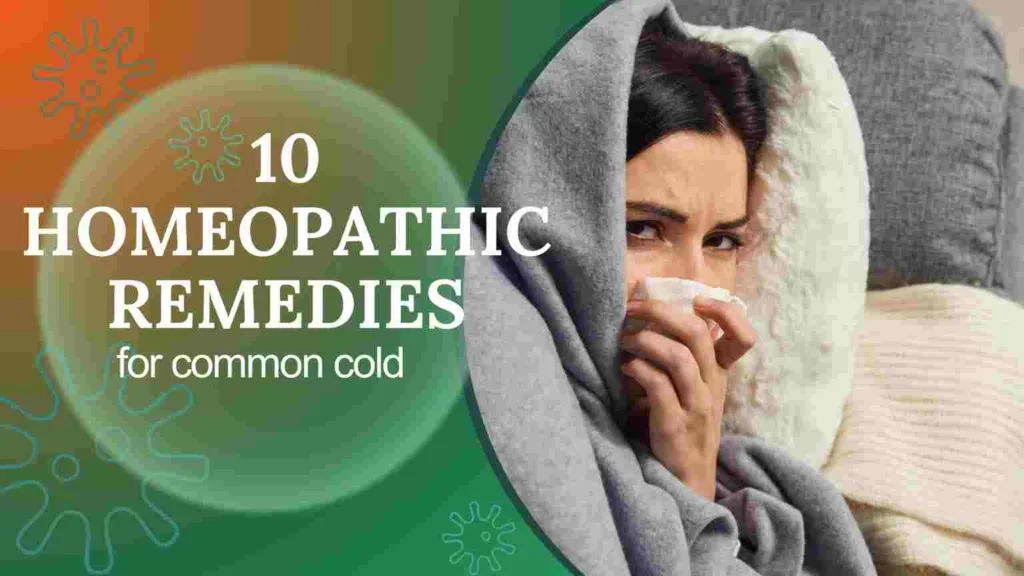In the realm of common ailments, cold coryza, commonly referred to as the common cold, emerges as a widespread yet bothersome affliction.
Introduction
Table of Contents
It’s a condition that impacts millions globally, bringing discomfort and inconvenience. This article delves into the reasons behind cold coryza, effective avoidance strategies, and explores 10 homeopathic remedies to alleviate its symptoms.
The Common Causes
Common causes of cold coryza, also known as the common cold, include:
1. Rhinoviruses: These are the most common viral pathogens responsible for causing cold symptoms. There exist more than 100 distinct types of rhinoviruses.
2. Coronaviruses: Certain strains of coronaviruses can cause cold-like symptoms, although some can lead to more severe respiratory illnesses such as COVID-19.
3. Respiratory Syncytial Virus (RSV): RSV is a common cause of respiratory tract infections, especially in young children and older adults.
4. Adenoviruses: Adenoviruses can cause a range of respiratory illnesses, including the common cold.
5. Enteroviruses: Some enteroviruses can cause cold symptoms, though they are more commonly associated with gastrointestinal infections.
6. Influenza viruses: While influenza (flu) typically causes more severe symptoms than the common cold, some strains can present with mild cold-like symptoms.
7. Parainfluenza viruses: These viruses can cause respiratory infections, including colds, particularly in children.
8. Human metapneumovirus (hMPV): This virus is a common cause of respiratory infections, especially in young children and older adults.
9. Environmental factors: Exposure to cold weather, low humidity, and crowded environments can increase the risk of contracting a cold by weakening the immune system or facilitating the spread of viruses.
10. Weakened immune system: Individuals with compromised immune systems due to factors such as stress, lack of sleep, malnutrition, or underlying health conditions are more susceptible to catching a cold.
The Common Culprits
1. Viral Invasion
The most frequent cause of cold coryza is viral infections. Rhinoviruses, specifically, are well-known for initiating the common cold.
2. Seasonal Influences
The common cold tends to occur more frequently during colder months, mainly because of indoor crowding and decreased ventilation.
3. Weakened Immune System
A compromised immune system can heighten susceptibility to the common cold. Factors such as stress, insufficient sleep, and inadequate nutrition exacerbate this vulnerability.
Prevention of Cold Coryza
1. Hand Hygiene
Frequent handwashing can greatly decrease the likelihood of catching the common cold, as it prevents the transfer of viruses from surfaces to your face.
2. Avoid Close Contact
Keeping a distance from individuals exhibiting cold symptoms can aid in minimizing the spread of the virus.
3. Boost Your Immunity
Eating a balanced diet, getting enough sleep, and managing stress can improve your immune system’s ability to fend off the common cold.
Homeopathic Remedies For Cold Coryza
Homeopathy provides a natural and holistic method to alleviate symptoms of the common cold. Here are ten effective remedies:
1. Aconitum Napellus
Effective in the initial phases of the common cold, Aconitum Napellus can aid in reducing fever and restlessness. Fear or cold air exposure may be present.
2. Allium Cepa
When dealing with a runny nose and watery eyes, Allium Cepa can provide relief. In nose their is a acrid discharge causes irritation in nose which produce a burning sensation.
3. Euphrasia Officinalis
Euphrasia Officinalis is beneficial for cold coryza with a burning sensation in the eyes and profuse nasal discharge. This is opposite to Allium cepa.
4. Nux Vomica
For colds worsened by excessive consumption of spicy or rich foods, Nux Vomica can assist in alleviating symptoms.
5. Pulsatilla Nigricans
Pulsatilla Nigricans is recommended for colds characterized by a thick, yellowish nasal discharge and a preference for fresh air. Pulsatilla patient has no thirst with dryness of mouth.
6. Bryonia Alba
When experiencing cold symptoms accompanied by a dry, painful cough and irritability, Bryonia Alba may offer relief. Bryonia keynote symptom is dryness of mouth with thirst for large amount of water at a time due to dryness of mucous membrane.
7. Arsenicum Album
Arsenicum Album is appropriate for colds accompanied by feelings of restlessness, anxiety, and a preference for warmth. Arsenic patient has a thirst for small quantity of water at a short interval frequently.
8. Gelsemium Sempervirens
If you feel weak, have a heavy head, and experience drowsiness during a cold, Gelsemium Sempervirens might be helpful. Gelsemium patients are thirstlessness.
9. Drosera Rotundifolia
Drosera Rotundifolia is useful for a lingering cough that worsens at night.
10. Rhus Toxicodendron
When cold coryza causes aching pain in muscles and restlessness, Rhus Toxicodendron can offer relief. Rhus Toxicodendron is the complementary to Bryonia so some times both are required after each other. Rhus Tox patient is thirsty.
Conclusion
Although common, cold coryza can be effectively managed through preventive measures and homeopathic remedies. By maintaining good hand hygiene, avoiding close contact with infected individuals, and bolstering your immune system, you can significantly reduce the risk of falling prey to the common cold. Additionally, homeopathic remedies such as Aconitum Napellus, Allium Cepa, and Euphrasia Officinalis provide natural relief from its symptoms.
FAQs
Q.1. Are homeopathic remedies safe for children?
Ans. Yes, homeopathic remedies are generally safe for children when administered in appropriate doses. It’s advisable to consult a qualified homeopath for guidance.
Q. 2. How long does a typical cold coryza episode last?
Ans. The duration of a cold coryza episode can vary, but it usually lasts around 7-10 days.
Q. 3. Is it safe to use homeopathic remedies in conjunction with conventional medicine?
Ans. Yes, homeopathic remedies can be used alongside conventional medicine, but it’s essential to consult a healthcare professional for guidance.
Q. 4. What dietary changes can help prevent cold coryza?
Ans. A diet rich in vitamins, minerals, and antioxidants can bolster your immune system and reduce the risk of contracting cold coryza.
Q. 5. Is there a vaccine for the common cold?
Ans. No, there isn’t a vaccine for the common cold due to the vast number of viruses that can cause it.
Integrating these strategies and homeopathic remedies into your lifestyle can assist in maintaining your health and minimizing the effects of cold coryza when it occurs. Remember that prevention is always better than cure, and a strong immune system is your best defense against this common ailment.





